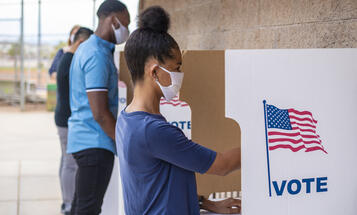
This is the Day Undocumented Families Won the Right to Equal Access to Education (Plyler v. Doe)
Today is a day to celebrate a great anniversary in the immigrant and Latino civil rights movement. Thirty-five years ago today, in the case of Plyler v. Doe, 457 U.S. 202 (1975), the Supreme Court held that the Equal Protection clause of the Fourteenth Amendment protects the rights of undocumented immigrants to equal access to public education. But today more than ever, we must fight to protect these fundamental rights for millions of American families.
Over 26 percent of children in the United States have an immigrant parent. That’s more than one-fourth of all U.S. children. The majority of immigrants and their children are Latino, and over 80 percent are people of color. The present and future well-being of our nation depends on immigrant children having equal access to education.
I’ll be talking about these issues in a twitter event at 8 p.m. tonight with Voto Latino, Latino Justice, United Farm Workers, National Domestic Workers Alliance, Kids in Need of Defense, Reform Immigration for America and #Latism.
The Trump administration is attacking every immigrant’s rights, including those of children. Based on "alternative facts" and constitutionally questionable policies, Trump’s Executive Order of January 25 clarified that he is decreasing due process and exempting no one from deportation. This week, his director of Immigration and Customs Enforcement (ICE) clarified that every single one of 11 million undocumented persons “should be worried.” ICE even arrested an undocumented student who was about to graduate from high school, on the day of his senior prom.
ICE has also been arresting parents while they are dropping off their children at school, which obviously makes the educational experience terrifying—and unequal—for children of undocumented immigrants. In one incident in Los Angeles, 13-year-old Fatima Acevedo is heard sobbing in a video as her father is taken away by ICE.
Despite the racist, draconian policies of the Trump administration, the law and justice are on our side, and together, we can and will protect immigrant children. The very least that we can do is protecting equal access to education for this generation of immigrant children. This can be done through appropriate school sanctuary policies, as well as through challenging the actions of ICE based on the legal doctrine established in Plyler v. Doe.
As we discussed in our Sanctuary, Safety and Community report co-authored with LatinoJustice PRLDEF, the Plyler decision clarified that fundamental Due Process and Equal Protection rights do not only belong to U.S. citizens, but instead apply to every person found within the territory of a state. The Plyler decision was also based on the principles and rules against discrimination in education set forth in Brown v. Board of Education. In perhaps the most moving and currently relevant passage of the Plyler opinion, Justice Brennan wrote, “What we said… in Brown v. Board of Education, 347 U. S. 483 (1954), still holds true:
In short, the Supreme Court held that because status-based discrimination against undocumented immigrants in public education creates lifetime damages, it is unconstitutional. That precedent is still the law today.
In more recent history, in 2010, Alabama enacted policies requiring public schools to collect immigration status information from schoolchildren and their parents, to be provided for immigration enforcement purposes. The Alabama case illustrated the extremely detrimental impact of such policies on Latino children who were fearful for themselves and their parents, causing Latino enrollment to drop. This created a Trumpian level of havoc and suffering at the state level. But based on the Plyler doctrine, in 2012, the Eleventh Circuit Court of Appeals found that Alabama’s policies were another form of unconstitutional status-based discrimination (and the Supreme Court declined to review the decision). Hispanic Interest Coalition of Alabama v. Governor of Alabama, 691 F.3d 1236, 1245 (11th Cir. 2012), cert denied, 133 S. Ct. 2022 (2013).
Today, under the Trump administration, such an impact is expected in any immigrant community if status information collected by schools can be used for federal immigration enforcement. But based on the Plyler doctrine, it is clear that public schools must not disclose any information about the immigration status of children and their families for purposes of immigration enforcement. Public schools should also enact policies against inquiring about immigration status (unless needed to assist students, and then kept confidential). School policies must also prohibit federal immigration officials from being on or near school property, including school buses, and prohibit ICE from using any school resources to contact students and their families.
The majority of hate speech since the November 2016 election has occurred in K-12 schools, followed by stores and restaurants, and thirdly, in colleges. Under the Plyler doctrine, policies protecting students and prohibiting harassment based on immigration and other statuses are clearly needed. And finally, in law that has yet to be developed, advocates should explore challenging ICE itself, along with any local school district that collaborates with immigration enforcement in any way that impacts equal access to education.
This is the day to remember that it is the law and justice, and not the government, which are the ultimate determinants of what is right and wrong for this generation of immigrants and their children, whom we must welcome into our democracy.



